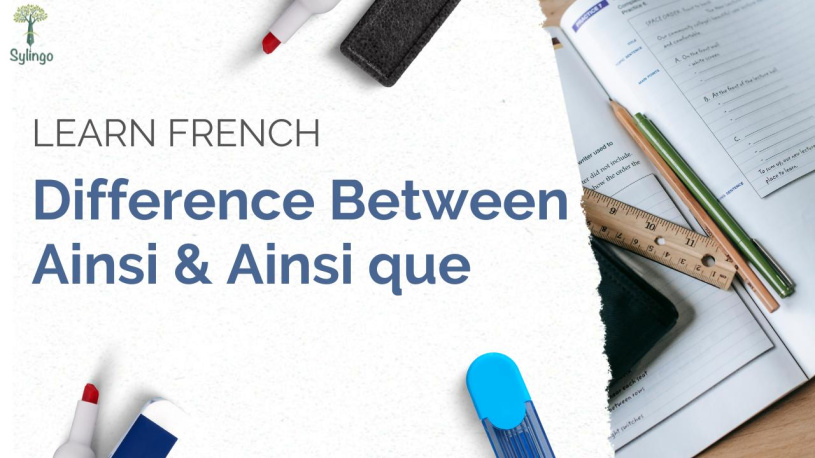In French, "Ainsi" and "Ainsi que" are both adverbs used to express manner, similarity, or consequence. However, they are used in different contexts and have distinct meanings. Let's explore their differences with examples and exercises for practice.
Ainsi:
-
"Ainsi" is an adverb that typically means "therefore or thus" or "in this/that way."
-
It is used to indicate the manner in which something is done or to express a result or consequence.
When used at the beginning of a sentence, it means "therefore" or "thus":
Examples:
- Ainsi, j'ai loupé le bus. (Therefore, I missed the bus.)
- Ainsi, elle a réalisé la situation. (Thus, she realized the situation.)
- Il a étudié dur, ainsi il a réussi ses examens." (He studied hard, thus he passed his exams.)
When used at the end of a sentence, it means "in this/that way":
Examples:
- Elle s'habille ainsi. (She dresses in this way.)
- Je l'ai cuisiné ainsi. (I cooked it this way.)
Ainsi que:
-
"Ainsi que" is a conjunction that translates to "as well as" or "just like."
-
Usage: It is used to connect two elements that are similar or to introduce an additional element that is similar to the one mentioned.
"Ainsi que" followed by a subject and a verb means "as well as":
Examples:
- Je rencontrerai Pierre ainsi que Mary. (I will meet Pierre as well as Mary.)
- Mon ami, ainsi que mon frère, ont été heureux. (My friend, as well as my brother, was happy.)
- Je suis allée au marché, et j'ai acheté des fruits ainsi que des légumes. (I went to the market and bought fruits as well as vegetables.)
- Il aime voyager, ainsi que sa sœur." (He likes to travel, as well as his sister.)
"Ainsi que" followed by a noun means "such as" or "like":
Examples:
Ainsi que je voulais dire. (Such as I wanted to say.)
Il a réussi ainsi que je m’y attendais. (It is successful, like I expected.)
Exercises:
Translate the following sentences into French:
-
She sings beautifully, thus she captivates her audience.
-
He enjoys reading, as well as writing.
-
She speaks French, thus she understands Spanish.
-
He is interested in music, as well as painting.
Fill in the blanks with either "Ainsi" or "Ainsi que":
-
Elle danse _______ une étoile.
-
Nous irons au parc, _______ au zoo.
-
________ je voulais dire, je ne peux pas venir.
-
Elle chante, ________ sa sœur.
Correction:
Translate the following sentences into French:
-
Elle chante magnifiquement, ainsi elle captive son public.
-
Il aime lire, ainsi que écrire.
-
Elle parle français, ainsi elle comprend l'espagnol.
-
Il s'intéresse à la musique, ainsi qu'à la peinture.
Fill in the blanks with either "Ainsi" or "Ainsi que":
-
Ainsi
-
Ainsi que
-
Ainsi
-
ainsi que
Understanding the difference between "Ainsi" and "Ainsi que" is crucial for using them accurately in French. "Ainsi" is used as an adverb to express manner or consequence, while "Ainsi que" is used as a conjunction to indicate similarity. Practicing with examples and exercises will help reinforce your understanding and usage of these expressions in French.





